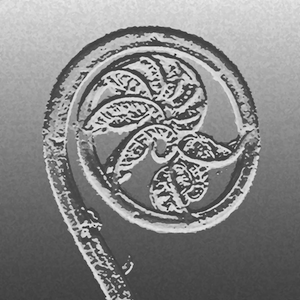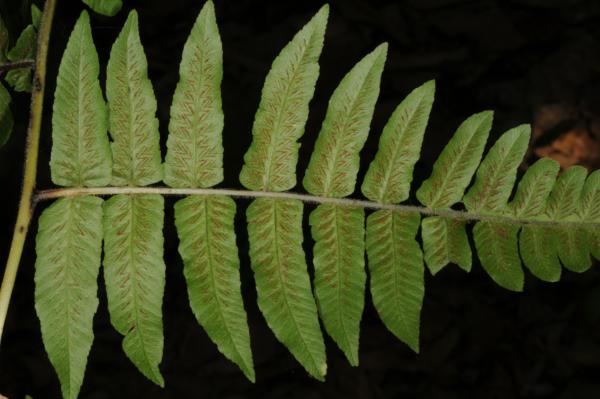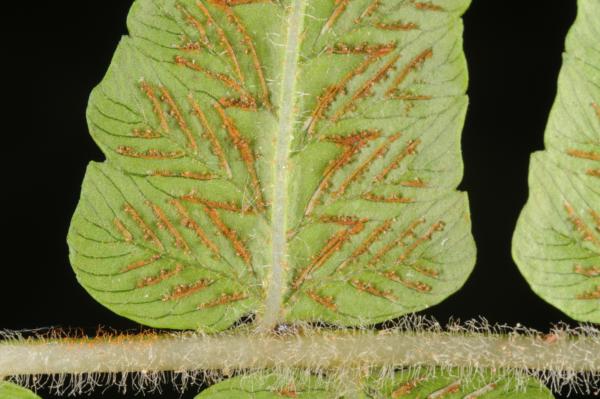
Diplazium esculentum (Retz.) Sw.
Family
Athyriaceae
Nomenclature
Diplazium esculentum (Retz.) Sw., Schrad. J. Bot. 1801(2): 312. 1803; Tardieu & C.Chr., Fl. Indo-Chine 7(2): 269. 1940; Tagawa & K.Iwats., SouthE. Asian Stud. 3(3): 88. 1965; Tagawa & K.Iwats., SouthE. Asian Stud. 5: 106. 1967; Holttum, Dansk Bot. Ark. 23: 242. 1965; Tagawa & K.Iwats., Fl. Thailand 3: 466. 1988; Boonkerd & Pollawatn, Pterid. Thailand: 153, 154, 192. 2000; Newman et al., Checkl. Vasc. Pl. Lao PDR: 33. 2007. – Hemionitis esculenta Retz., Obs. Bot. : 38. 1791. – Anisogonium esculentum (Retz.) C.Presl, Tent. Pterid.: 116. 1836; Bedd., Handb. Ferns Brit. India: 192, f. 94. 1883. – Athyrium esculentum (Retz.) Copel., Philipp. J. Sci., Sect. C, Botany 3: 295. 1908; Holttum, Rev. Fl. Malaya ed. 1, 2: 562 f. 333. 1955 [‘1954’].
Description
Rhizome erect, sometimes more than 1 m in height; scales up to 10 by 1.2 mm, dark brown, black-margined, toothed with Y-shaped teeth. Stipes about 70 cm long. Laminae variable in size, often more than 1 m long, bipinnate, or pinnate when young or small; lower 1 or 2 pinnae often reduced, larger pinnae up to 40 by 25 cm, rather suddenly narrowing towards acute apex; larger pinnules subsessile or shortly stalked, subcordate or auricled at base, narrowing towards acuminate apex, up to 13 by 2.5 cm, lobed to 1/4 way to costule; lobes rounded at apex, serrate, papyraceous; veins pinnate, veinlets up to 10 pairs, uniting with the opposite ones forming excurrent veinlets (seemingly goniopteroid venation). Sori on nearly the whole length of veinlets, often uniting with opposite ones.
Distribution in Thailand
NORTHERN: Mae Hong Son, Chiang Mai, Chiang Rai, Lampang, Tak; EASTERN: Chaiyaphum; SOUTH-WESTERN: Kanchanaburi, Phetchaburi; CENTRAL: Saraburi, Nakhon Nayok, Bangkok; SOUTH-EASTERN: Chon Buri; PENINSULAR: Surat Thani, Satun, Narathiwat.
Distribution in Laos
Vientiane.
Distribution in Cambodia
Mondulkiri, Ratanakiri.
Wider Distribution
Tropics of Asia, north to Central China and S Japan, east to S Pacific Islands.
Ecology
Usually on moist, level ground in paddy fields or along rivers in open places or at least in light shade at low or medium elevations less than 800 m alt.
IUCN Conservation Assessment
Least Concern (LC) as listed on the IUCN Red List at http://www.iucnredlist. org/apps/redlist/details/194150/0.
Notes
Young fronds locally consumed as a vegetable. The Delacour specimen from Khammouane in Laos mentioned by Tardieu & Christensen (1940) is sterile but is probably a Cyathea .
Voucher specimens - Thailand
Hennipman 3315, Chiang Mai, Fang (P); Maxwell 92-804, Chiang Mai, Chiang Dao (P); Smith 2636, Surat Thani, Bandon (P).
Voucher specimens - Laos
Maxwell 99-211, Vientiane (CMU).
Voucher specimens - Cambodia
Long et al. CL404 & CL459, Mondulkiri (P); Matras 25, Ratanakiri (P).
Lower surface of lamina
Venation
Sori
Site hosted by the Royal Botanic Garden Edinburgh. Content managed by Stuart Lindsay, Gardens by the Bay, Singapore and David Middleton, Singapore Botanic Gardens. Last updated 24 January 2012

_PK_7404_sml.JPG)
